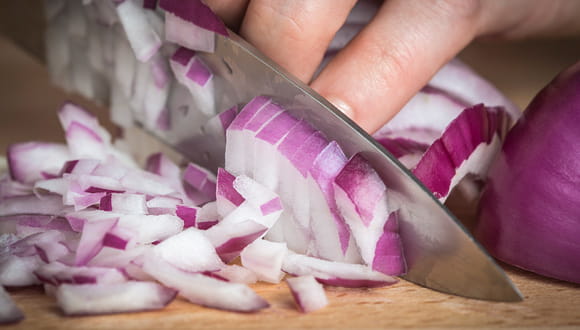"Mine eyes smell onions; I shall weep anon."
William Shakespeare penned those words more than 400 years ago. Although we don't know much about Shakespeare's prowess in the kitchen, it's clear he understood the discomfort caused by cutting onions.
The phenomenon Shakespeare described happens to most people — slice into a fresh onion and the tears flow. But, what causes us to cry when cutting onions? The answer: protection.
When you cut into an onion, substances that were safely separated are released and allowed to combine, creating nature's version of tear gas. It's the onion's self-defense mechanism. When the vapor comes in contact with your eyes, your tear response is activated to protect your eyes.
Boohoo.
So, how do you keep from crying when cutting onions?
Although tips for staying tear-free when cutting onions are abundant, few, if any, are truly effective. Chilling or freezing your onions before chopping them can slow down the enzymes responsible for eye irritation, but only so much, unfortunately.
For most of us, the price of having freshly cut onions is a good cry.
Need a distraction from crying when cutting onions? Enjoy this fun onion trivia!
An onion by any other name.
The word "onion" comes from the Anglo-French word "union" and the Old French "oignon." Both words originally derived from the Latin "unionem," meaning "one, unity" reflecting the layers of an onion.
"Pass the onions," said our ancestors.
Onions have been a part of our diet for a very long time. Experts estimate that we've been cultivating them for 5,000 years. In fact, when three Mesopotamian tablets estimated to be nearly 4,000 years old were deciphered in 1985, researchers found that they contained recipes that heavily featured onions.
Where in the world are the most onions eaten?
According to the National Onion Association, the top onion-eating nation is Libya, with an average per capita consumption of 66.8 pounds each year. Although the U.S. is nowhere near claiming Libya's No. 1 spot, data shows that the onion's popularity has risen significantly — from 12.2 pounds per person in 1982 to more than 20 pounds in 2019.
Mummies loved 'em.
According to an article published by New Mexico State University's College of Agricultural, Consumer, and Environmental Sciences on the history of the mighty onion, it wasn't uncommon for Egyptian mummies to be entombed with them. In one gruesome example, King Ramses IV, who died in 1160 B.C., was mummified with onions in his eye sockets. Yuck!
What about Funyuns?
I'm so glad you asked! Introduced by Frito-Lay in 1969, Funyuns, the yellow, ring-shaped snack food, are — no surprises here — not made from onions. Marketed as "onion-flavored," Funyuns consist mostly of cornmeal, but their shape and color are meant to resemble fried onion rings. Fun fact: Early advertising featured the 1966 novelty song, "I Love Onions" by Susan Christie — feel free to add that bop to your workout playlist.
Will onion juice help your hair grow?
You might not be surprised to learn that there's very little research on this topic. But, a 2002 article published by the Japanese Dermatological Association does include some promising results from a small study: 23 participants with hair loss had onion juice applied to their scalp twice a day and, after six weeks, hair regrowth was observed in all but three of the participants. We're still waiting to find out if the hair growth was worth the persistent onion smell.


